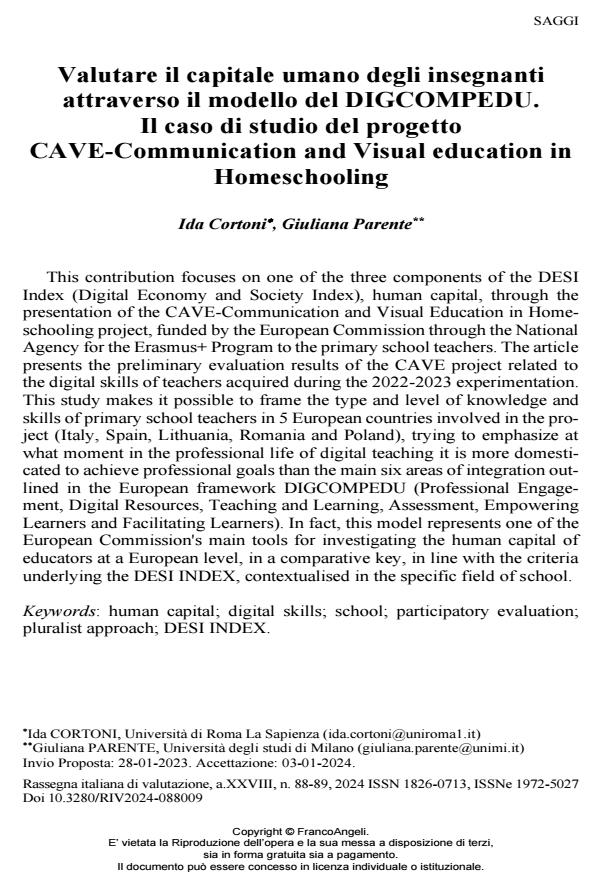Valutare il capitale umano degli insegnanti attraverso il modello del DIGCOMPEDU. Il caso di studio del progetto CAVE-Communication and Visual education in Homeschooling
Titolo Rivista RIV Rassegna Italiana di Valutazione
Autori/Curatori Ida Cortoni, Giuliana Parente
Anno di pubblicazione 2024 Fascicolo 2024/88-89
Lingua Italiano Numero pagine 26 P. 162-187 Dimensione file 637 KB
DOI 10.3280/RIV2024-088009
Il DOI è il codice a barre della proprietà intellettuale: per saperne di più
clicca qui
Qui sotto puoi vedere in anteprima la prima pagina di questo articolo.
Se questo articolo ti interessa, lo puoi acquistare (e scaricare in formato pdf) seguendo le facili indicazioni per acquistare il download credit. Acquista Download Credits per scaricare questo Articolo in formato PDF

FrancoAngeli è membro della Publishers International Linking Association, Inc (PILA)associazione indipendente e non profit per facilitare (attraverso i servizi tecnologici implementati da CrossRef.org) l’accesso degli studiosi ai contenuti digitali nelle pubblicazioni professionali e scientifiche
This contribution focuses on one of the three components of the DESI Index (Digital Economy and Society Index), human capital, through the presentation of the CAVE-Communication and Visual Ed-ucation in Homeschooling project, funded by the European Commis-sion through the National Agency for the Erasmus+ Program to the primary school teachers. The article presents the preliminary evaluation results of the CAVE project related to the digital skills of teachers ac-quired during the 2022-2023 experimentation. This study makes it pos-sible to frame the type and level of knowledge and skills of primary school teachers in 5 European countries involved in the project (Italy, Spain, Lithuania, Romania and Poland), trying to emphasize at what moment in the professional life of digital teaching it is more domesti-cated to achieve professional goals than the main six areas of integra-tion outlined in the European framework DIGCOMPEDU (Professional Engagement, Digital Resources, Teaching and Learning, Assessment, Empowering Learners and Facilitating Learners). In fact, this model represents one of the European Commission's main tools for investigat-ing the human capital of educators at a European level, in a compara-tive key, in line with the criteria underlying the DESI INDEX, contex-tualised in the specific field of school.
Parole chiave:human capital; digital skills; school; participatory evalua-tion; pluralist approach; DESI INDEX.
Ida Cortoni, Giuliana Parente, Valutare il capitale umano degli insegnanti attraverso il modello del DIGCOMPEDU. Il caso di studio del progetto CAVE-Communication and Visual education in Homeschooling in "RIV Rassegna Italiana di Valutazione" 88-89/2024, pp 162-187, DOI: 10.3280/RIV2024-088009